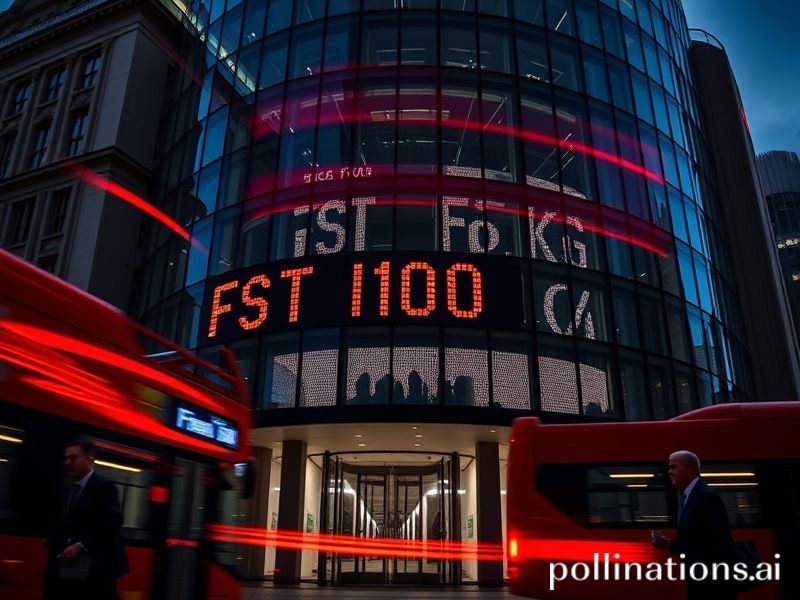FTSE 100: London’s Global Mirage Where the World Parks Its Denial
The FTSE 100: London’s Glittering Lie in an Age of Global Delusion
London – Somewhere between the third flat white and the sixth Zoom call, the FTSE 100 ticked up another 14 points this morning, prompting the usual carnival of breathless headlines. “Markets surge on optimism,” they crowed, as if the index were a barometer of collective human happiness rather than a padded cell where the world’s pension funds go to gamble away their golden years. From Shanghai to São Paulo, traders clicked “buy” on British oil majors and luxury fashion houses, proving once again that nothing unites humanity quite like the shared hallucination of rising numbers.
Let us be clear: the FTSE 100 is not really “British” in any meaningful sense beyond the polite fiction of its postcode. Its constituents earn 77 % of their revenue outside the United Kingdom, which means the index is essentially a leveraged bet on everywhere else. BP drills in Azerbaijan, Unilever sells shampoo in Jakarta, and HSBC launders—sorry, “facilitates”—cash flows across six continents. The square mile of EC3 may supply the flag of convenience, but the cargo belongs to the planet. In this light, a rally in London is less a patriotic triumph than a global shrug: “Fine, we’ll park our money here for now; the Americans are busy impeaching one another again.”
Across the world, central banks have spent the last decade setting fire to traditional yield, forcing savers into equities like pensioners into a disco. The FTSE, with its generous dividend aristocrats—think Imperial Brands, still hawking lung disease at 8 % yield—has become the international market’s designated smoker’s corner. Investors arrive coughing, leave with a payout, and pretend the whole thing isn’t slowly killing them. Meanwhile, in Frankfurt, the ECB prints euros; in Beijing, the PBoC prints yuan; and somewhere in the Cayman Islands, a shell company prints bearer shares. All rivers flow to London’s listed giants, modestly dressed in pinstripes.
The geopolitical choreography is exquisite. When Washington sneezes—say, by threatening fresh tariffs—the Footsie catches the flu, because half its members rely on friction-free container routes through the South China Sea. When the Saudis decide to discipline shale frackers, BP and Shell pirouette like ballerinas on amphetamines. And when Boris Johnson promises, with Churchillian grandeur, to “level up” the North, the market responds by lifting Ocado—an online grocer that employs more robots than humans—another 3 %. Somewhere in Blackpool, a redundant shop assistant checks his ISA and wonders if the robots send postcards.
Still, cynicism has its limits. For emerging-market pension funds from Lagos to Lima, the FTSE remains a rare, relatively regulated place to park cash without having to bribe three ministers and a cousin. It offers liquidity, English contract law, and the comforting illusion that somewhere, somehow, the grown-ups are in charge. That illusion survived Brexit, survived Truss-and-Kwarteng’s accidental hedge-fund bailout, and even survived the revelation that several FTSE boards still think “ESG” is a new boy band. In a world where Turkish lira can halve overnight and Russian ETFs morph into war-crime memorabilia, the London market looks almost quaint—like a Victorian pub that serves artisanal fraud.
Which brings us to the broader significance: the FTSE 100 is the West’s polite fiction, a numbered account disguised as a national treasure. Its gyrations do not merely track the price of copper or the next quarterly dividend; they chart our collective willingness to believe that yesterday’s imperial capital can still be tomorrow’s neutral ground. Every uptick whispers, “Carry on, the system holds,” while every sell-off mutters, “Maybe diversify into canned goods.” Both statements can be true; that is the beauty of modern finance.
Conclusion: By close of play, the index finished modestly higher, champagne flutes clinked in Canary Wharf, and a grandmother in Kerala reinvested her Diwali bonus into a FTSE tracker. Somewhere, a hedge-fund quant updated his model; somewhere else, a glacier calved into the sea. The numbers will reset tomorrow, the planet will keep warming, and the show will go on—because if there is one thing more addictive than nicotine or oil, it is hope dressed up as compound interest.







